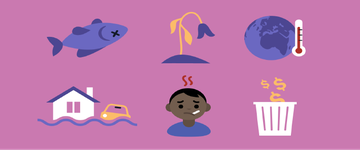Background
About the Plastic Challenge
This Plastic Challenge was adapted from the "Plastic Tide Turners Challenge" originally created by the World Organization of the Scout Movement and UN Environment Programme. To participate, sign the pledge below:
Why does Plastic Pollution Matter?
Read on to learn more about how plastic impacts our planet. By the end of the article you will know six ways in which plastic hurts the planet and will be ready to participate in the plastic challenge activities!

6 Ways Plastic Hurts the Planet
- Harming our marine friends: Many marine animals swallow plastic items or get trapped in them and often die as a result. Around 11.1 billion plastic items are tangled in coral reefs—blocking their oxygen and light and releasing harmful chemicals.
- Spoiling our soil: Plastic takes its toll on land, too. Plastic from landfills leaks toxins into the soil and water, affecting the health of soil, plants, and soil dwellers performing essential ecosystem services like earthworms. By entering the soil, plastic finds its way back to us via the crops we eat. Even cows have been known to eat plastic bags. In livestock farms in Nairobi as many as 20 bags per cow have been found inside cow stomachs. Not good either for cows or for humans who eat beef or drink cows milk.
- Contributing to climate change: Yep, plastic is behind climate change, too. Plastic is made from petroleum and making plastic products accounts for around 8 percent of the world’s oil production. That figure is projected to rise to 20 percent by 2050. Drilling for oil and processing it into plastic releases greenhouse gases into the environment, which causes global warming and hence contribute to climate change. And even when it’s just sitting around in seawater and sunlight, plastic releases greenhouse gases.
- Causing flooding: Did you know that plastic waste can cause flooding in cities? The thing is, plastic clogs drains and waterways, which is a key cause of urban flooding in many countries such as India and Bangladesh.
- Making us sick: When plastic bags block sewage systems, this results in stagnant water that provides a breeding ground for mosquitoes and other pests. This situation can lead to the spread of malaria and other vector-borne diseases.
- Expensive to clean up: We spend billions each year dealing with trash, cleaning our streets and parks. Plastic affects our economies in other ways, too, for example by discouraging tourism. Who wants to go visit places covered in plastic trash?
Average Rating: ☆ ☆ ☆ ☆ ☆ (0 reviews)


